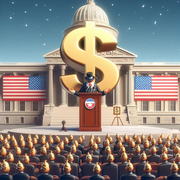Strategic planning for sustainable development, economic stability, and social progress is prioritized.
One ongoing problem compromising democratic values is the role of money in politics. Often used to influence public policy, change public opinion, and tip elections, BD also undermine public trust. This section explores the several ways BD shapes our political structure.
Campaign Money: High Stakes Game
 Rich people and businesses can spend unlimited sums of money to influence elections without revealing their contributors thanks to Super PACs, independent expenditure groups, and dark money organizations. Voters find it challenging to grasp the actual reasons behind these expenses due of lack of openness.
Rich people and businesses can spend unlimited sums of money to influence elections without revealing their contributors thanks to Super PACs, independent expenditure groups, and dark money organizations. Voters find it challenging to grasp the actual reasons behind these expenses due of lack of openness.
Lobbying and Special Interests
Using their financial resources, lobbyists—who represent businesses, trade associations, and other interest groups—use influence on legislators and shape laws. Policies resulting from this could serve the public interest rather than the few that would gain from them.
The Influence on Policymaking
Significant financial resources allow industries to influence regulatory bodies to implement regulations that benefit their interests. Reduced consumer protections, environmental rules, and labour safety requirements can follow from this.
Gerrymandering
Gerrymandering—the altering of election district borders to support a specific party or group—helps to further consolidate political power and increase the impact of money.
Judicial Appointment
Rich contributors and special interest groups can affect the appointment of judges, therefore affecting the interpretation of laws and the execution of justice.
The Erosion of Public Belief
The too strong influence of money in politics might cause popular mistrust of government. Citizens may become cynical, apathetic, and a democratic system may be undermined when they believe that political decisions and voting are motivated by money interests instead of the general good.
The Requirement for Reform
Several reforms are required to solve the detrimental influence of BD on politics:
Campaign Finance Reform
Limiting campaign contributions, improving openness, and bolstering public financing of elections will help to lessen the impact of affluent contributors in Campaign Finance Reform.
Independent Redistricting Commissions
Removing partisan control over redistricting will help to ensure fair and competitive elections.
Lobbying Reform
Stricter rules on lobbying activities, including mandatory disclosure requirements and cooling-off periods for government officials, will help to help to control undue influence.
Judicial Reform
Using merit-based selection procedures for judges and improving judicial decision-making openness can help to lessen the impact of special interests.
These actions will help us to create a more fair and representative democracy in which every citizen’s voice—not just those of the wealthiest—is heard.
